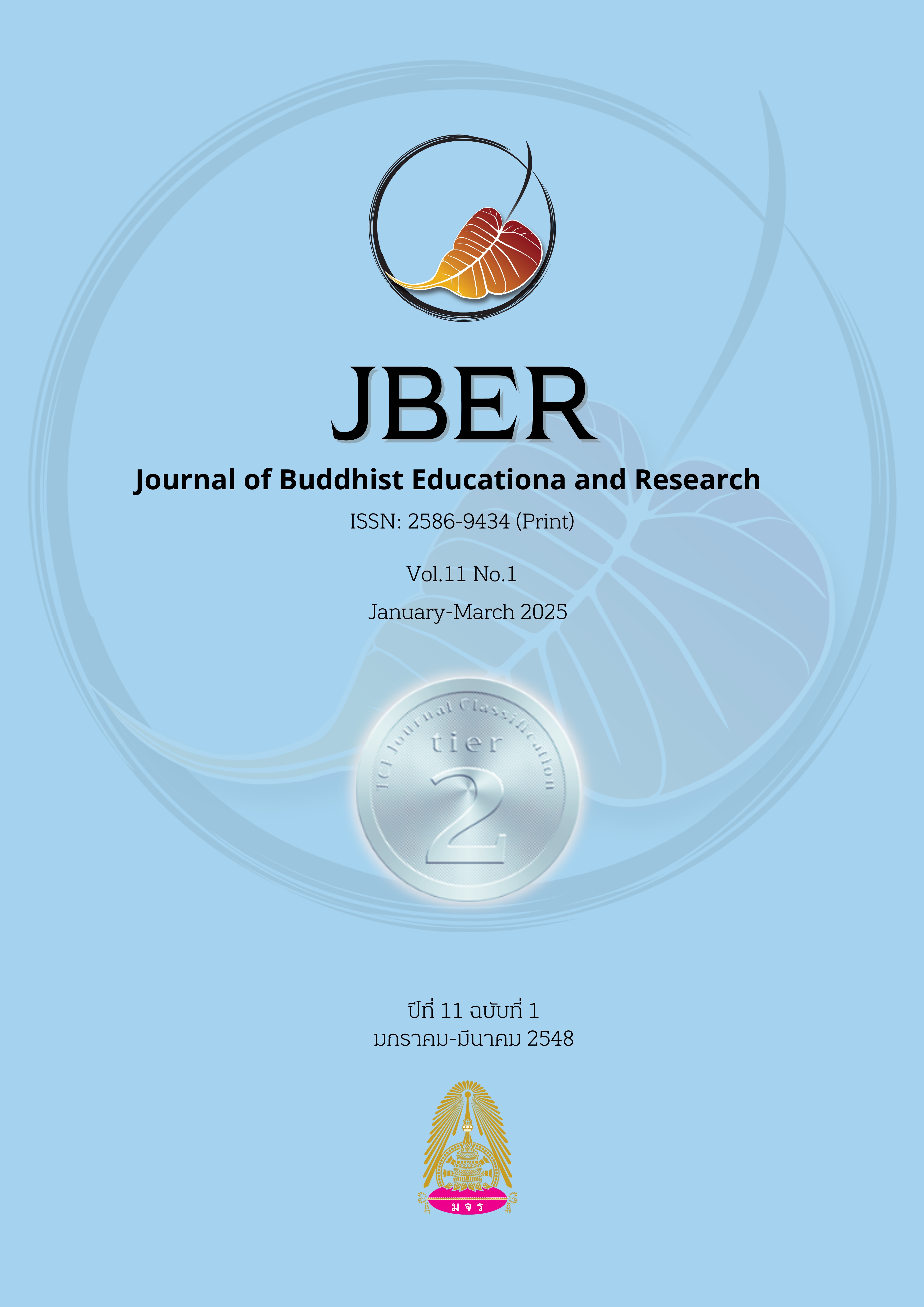Academic Administration in the 21st Century Based on the Four Iddhipāda Principles of School Administrators under the Khon Kaen Primary Educational Service Area Office 1
Keywords:
Academic Administration, 21st Century, Principles of IddhipādaAbstract
This research aimed to: 1) study the state of academic administration in the 21st century based on the Four Iddhipāda (Iddhipāda 4) principles of school administrators under the Khon Kaen Primary Educational Service Area Office 1; 2) propose guidelines for academic administration in the 21st century based on the Four Iddhipāda principles for school administrators under the Khon Kaen Primary Educational Service Area Office 1. This study employs a mixed-methods approach, incorporating both quantitative and qualitative research. The sample group includes 252 participants, comprising school administrators, deputy administrators, and department heads. Statistical methods used include frequency, percentage, mean, and standard deviation. The qualitative research data was collected through interviews with 12 key informants, selected through purposive sampling to ensure validity and reliability. The research results were as follows: 1. The state of academic administration in the 21st century based on the Four Iddhipāda principles among school administrators shows that the highest average practice was observed in: Chanda (zeal or desire); Citta (thoughtful attention); Vīmaṁsā (investigation) and Viriya (perseverance). 2. Guidelines for academic administration in the 21st century based on the Four Iddhipāda principles suggest that school administrators should: (1) enhance satisfaction with practices and establish clear guidelines for developing assessment and evaluation tools; (2) maintain perseverance in supervising, monitoring, and continuously evaluating the implementation of teachers' curricula; (3) exhibit attentiveness by requiring teachers to submit their learning management plans regularly; (4) understand and analyze the strengths and weaknesses of the curriculum to ensure its alignment with the evolving needs of society.
References
บุญชม ศรีสะอาด. (2544). การวิจัยเบื้องต้น. กรุงเทพมหานคร: บริษัท สุวีริยาสาส์น จำกัด.
สำนักงานเขตพื้นที่การศึกษาประถมศึกษาขอนแก่น เขต 1. (2566). แผนปฏิบัติการประจำปี งบประมาณ 2566. เอกสารกลุ่มนโยบายและแผน เล่มที่ 2/2566.
สำนักงานเขตพื้นที่การศึกษาประถมศึกษาขอนแก่น เขต 1. (2565). รายงานผลการดำเนินงานตามแผนปฏิบัติการ ประจำปีงบประมาณ พ.ศ. 2565. เอกสารกลุ่มนโยบายและแผน 2565.
สำนักงานคณะกรรมการการศึกษาขั้นพื้นฐาน กระทรวงศึกษาธิการ. (2566). แผนพัฒนาการศึกษาขั้นพื้นฐาน. โรงพิมพ์คุรุสภา ลาดพร้าว.
สำนักงานเลขานุการของคณะกรรมการยุทธศาสตร์ชาติ สำนักงานคณะกรรมการพัฒนาการเศรษฐกิจและสังคมแห่งชาติ. (2561). ยุทธศาสตร์ชาติ พ.ศ. 2561-2580. กรุงเทพมหานคร: สำนักงานคณะกรรมการพัฒนาการเศรษฐกิจและสังคมแห่งชาติ.
กุลนิติ เบ้าจรรยา และคณะ. (2566). การพัฒนาภาวะผู้นําของผู้บริหารสถานศึกษาในศตวรรษที่ 21 ตามหลักอิทธิบาท 4 สังกัดสำนักงานเขตพื้นที่การศึกษาประถมศึกษาขอนแก่น เขต 2. สถาบันวิจัยพิมลธรรม, 10(1), 73-85.
ปรีติ พรมลารักษ์. (2567). การบริหารงานวิชาการตามหลักอิทธิบาท 4 ของผู้บริหารสถานศึกษาในกลุ่มคุณภาพการศึกษากกดู่-นาแขม สังกัดสำนักงานเขตพื้นที่การศึกษาประถมศึกษาเลย เขต 1. วารสารสังคมศาสตร์บูรณาการ, 7(8), 77-90.
อมรรัตน์ ดาคม และคณะ. (2565). การบริหารงานวิชาการในศตวรรษที่ 21 ตามหลักอิทธิบาท 4 ของผู้บริหารสถานศึกษาในสังกัดสำนักงานเขตพื้นที่การศึกษาประถมศึกษาขอนแก่น เขต 4. Journal of Modern Learning Development, 2022(172-183).
Downloads
Published
How to Cite
Issue
Section
License
Copyright (c) 2025 Journal of Buddhist Education and Research (JBER)

This work is licensed under a Creative Commons Attribution-NonCommercial-NoDerivatives 4.0 International License.





